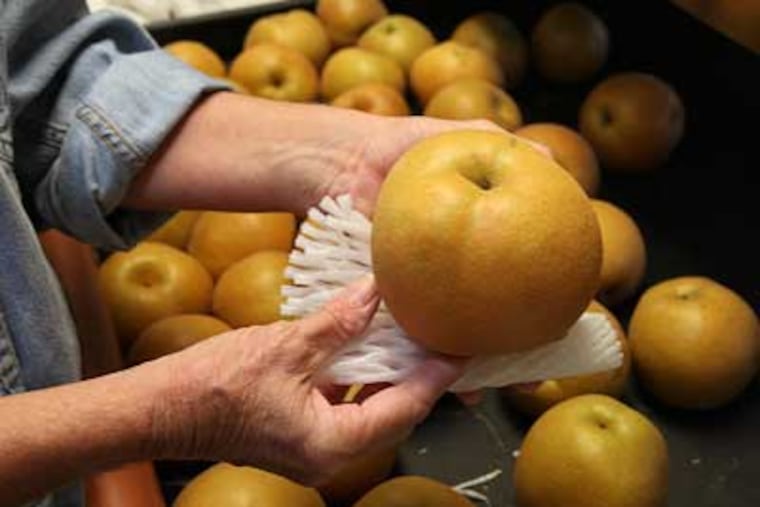Inventors Joel Spira and Ruth Rodale Spira bring Asian pears to Pennsylvania
ASIAN PEARS and American electronics inventions would seem to have little in common. Yet in Coopersburg, just northwest of Allentown in the Lehigh Valley, rolling hillsides of firm juicy Asian pears are being harvested, a testimony to grass-roots Japanese-American business relations.

ASIAN PEARS and American electronics inventions would seem to have little in common.
Yet in Coopersburg, just northwest of Allentown in the Lehigh Valley, rolling hillsides of firm juicy Asian pears are being harvested, a testimony to grass-roots Japanese-American business relations.
Joel Spira and Ruth Rodale Spira founded their privately held company, Lutron Electronics, back in the late 1950s when Joel, then a young physicist, invented the solid-state dimmer switch. His energy-saving device elevated mood lighting to a new level - the original dimmer switch model is in the Smithsonian Institution's collection on electricity. But it was just the start of an inventive career that claims more than 2,700 patents worldwide, most in the lighting business.
Joel and Ruth, a trained botanist thanks to her Rodale family roots (her father was J.I. Rodale, the organic farming icon and founder of Rodale Press in Emmaus), traveled extensively in Japan in the early 1970s to source components and forge relationships with suppliers. At the end of most meetings, a peculiar fruit would be served and shared as a sign of friendship. It was new to the Spiras, yellowish in color, sometimes speckled, round and firm. It tasted juicy like a pear but was crisp like an apple.
The couple, now in their 80s, were entranced and vowed to bring the fruit to Pennsylvania. Their company, Subarashii Kudamono (Japanese for "wonderful fruit"), was born in 1973 and is now the third largest Asian pear company in the U.S. by acreage.
The Spiras are committed to old-school growing methods, which include giving trees 10 feet of growing space, allowing for 360 degrees of sunshine, hand-pruning and thinning, and handpicking the fruit only when it's ripe.
Although the private company won't divulge sales figures, its three orchards yield tons of fruit that's sold at retail outlets such as Wegmans and Fair Foods at the Reading Terminal, as well as online. The company has five patented varieties, along with other products, including dried Asian pears and Asian pear blossom honey.
There's even a Riesling-style Asian Pear Wine, an Asian Pear Dessert Wine - think fortified ice wine - and an Asian Pear Eau de Vie (a clear brandy). All are available at Premium Collection state stores and by special order.
Although the Spiras are still involved in both the electronics and fruit business, they prefer to stay in the background and leave the daily management and marketing to Tom Sacks, a former Sony Electronics guy who never expected to be running an Asian pear business.
"Funny thing was, I also was introduced to Asian pears when I was doing business in Japan for Sony," said Sacks. He grew up around his grandfather's farm and worked in the fields to make extra cash. But he thought that the agriculture world was behind him when he went to college. Sacks joined Lutron in 2005 and took over Subarashii Kudamono in 2006.
"Managing is managing, but this business involves a whole different set of knowledge," he said. "I learn something new every day."
Pennsylvania's soil and climate conditions are ideal for growing Asian pears, not to mention apples and other kinds of pears. "Because are climate is harsher, the trees are sturdier and the fruit has a depth of flavor you won't find in more temperate locations," Sacks said.
Although the growing season runs from spring to fall, the trees need tending all year, including pruning from December through March, even in single-digit temperatures.
"Our business is influenced by our owners' integrity and culture. They have a real passion for doing things right - the Japanese way," Sacks said.
If you've never tasted an Asian pear, you aren't alone. Sacks was at a Produce Marketing Association event a few years back, where he heard a statistic that about 2 percent of the produce-buying population in the U.S. is familiar with the distinctive fruit. Sacks, working with company marketing manager Holly Harter, is trying to change that with an ongoing schedule of tastings and chef events throughout the region.
Typically priced in supermarkets at about $1.50 each and packaged in little mesh "socks" to prevent bruising, Asian pears add sweetness and crunch to salads and slaws and a subtle fruit nose to soups and stir-fries.
A taste test of five locally grown Subarashii Kudamonos varietals - AsaJu, Hosui, EliSan, JunoSan, LilySan and SuSan - delivered a delicate spectrum of flavors, from floral to apple to pear to pineapple. A ripe fruit has a lovely perfume and is firm. It should be refrigerated, since it is picked ready to eat.
Sacks likened raising consumers' awareness of Asian pears and their varieties to the journey that apples have taken in grocery stores during the recent past: "Remember when there used to be one kind of apple? Red Delicious?"
Now there are dozens, with shoppers beelining for favorites such as Junami, Honeycrisp and Macoun. European pears have gone the same route, now identified as Green Anjou, Red Anjou, Green Bartlett, Red Bartlett, Bosc, Comice, and more.
"We'll get there, too," Sacks predicted. "Once people taste these Pennsylvania-grown Asian pears, they fall in love with them."